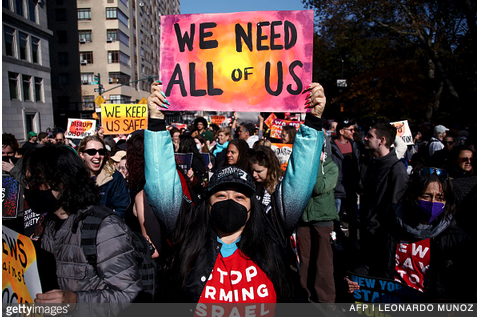Global Opinions
Our Venezuelan Embassy protest aims to push peace and diplomacy over war
By Medea Benjamin
May 7
Medea Benjamin is co-director of Code Pink and a member of the Embassy
Protection Collective.
Memories from Iraq keep running over and over in my mind as I and a group
of peace activists continue to struggle to remain in the Embassy of
Venezuela here in Washington, determined to prevent another reckless war.
My colleague Jodie Evans and I were in Baghdad in February 2003, when the
feared Saddam Hussein was still in power. Some of our Iraqi friends hated
him so much that they prayed for an U.S. invasion. A year later, when
chaos reigned and so many of their loved ones had died, they cursed the
American invaders and rued the day they had welcomed them.
Fast-forward 16 years. Many Venezuelans are anxious to get rid of Nicolás
Maduro. Disheartened by the failure of opposition leader Juan Guaidó to
spark an uprising, some are looking at U.S. intervention as the answer.
Trump’s war hawks, including national security adviser John Bolton, U.S.
Special Representative for Venezuela Elliott Abrams and Vice President
Pence, seem only too eager to oblige. I cringe at the thought of my
government, once again, invading another country and turning a bad
situation into a catastrophic one. U.S. intervention in Venezuela could
lead to a civil war that would plague Venezuela for decades and affect the
entire region.
Many scenarios could ignite a war with Venezuela, including a fight over
embassies. The United States and Venezuela broke diplomatic ties on Jan.
23, when Guaidó declared himself interim president and the Trump
administration immediately recognized him. Diplomats in both capitals
vacated their embassies, leaving skeletal staff but keeping the buildings
intact. Then on March 18, Guaidó’s representatives in the United States
escalated the tensions by appropriating Venezuela’s military attaché
building in Washington and the consulate in New York City, while
announcing plans to take over the D.C. embassy.
A takeover would be symbolic, since Guaidó’s appointees cannot fulfill
diplomatic or consular activities without holding power in Venezuela, but
it would still be illegal. According to Article 22 of the 1961 Vienna
Convention on Diplomatic Relations, diplomatic premises are inviolable and
the receiving state must protect the premises against any “intrusion or
damage and … prevent any disturbance of the peace of the mission or
impairment of its dignity.”
It would also be provocative because the Maduro government would likely
reciprocate by taking over the U.S. Embassy in Caracas. This could be just
the pretext that this administration is looking for to begin military
aggression.
Determined to stop this nightmare, a group of peace activists formed the
Embassy Protection Collective. We have various opinions about the Maduro
government —some pro, some neutral, some skeptical — but we are all
determined to stop U.S. intervention. With the permission of the
Venezuelan Ministry of Foreign Affairs, on April 10 we moved into the
four-story embassy in the Georgetown neighborhood. For weeks we went in
and out of the building freely, staying overnight on sofas and floors to
maintain our presence. Except for banners we posted outside saying things
such as “No Coup, Peace With Venezuela” and “No War for Oil,” our vigil
was low-key and barely noticed by the public.
All this changed on April 30, when a group of Guaidó supporters — almost
coinciding with his call for an uprising inside Venezuela — descended on
the embassy, determined to oust us and seize the building. They came
banging pots and pans, blaring piercing sirens, horns and megaphones. They
have used lasers to flash into our eyes at night while banging menacingly
on the doors with sledgehammers. They plastered their own signs all over
the building.
Most concerning, they have surrounded the embassy with tents and canopies
to block every entrance, refusing to allow food or medicine to the
activists inside, with the objective of starving us out. When we tried to
devise ways to get food (such as a pulley to the second-floor window),
they attacked us, screaming, “No food, no water, get out of our embassy.”
Shockingly, this atmosphere of hate and intimidation and the threat
against diplomatic property belonging to the Maduro government are all
taking place under the watchful eyes of dozens of agents from the Secret
Service, the agency tasked with guarding embassies. If you call the Secret
Service to complain, officers will read you a statement saying that no
individuals, medicine or food have been prevented from entering the
building, but this is not true. Even packages sent through the U.S. Postal
Service are not allowed in. It is appalling that the Secret Service is
allowing mob rule to take over in the heart of Washington.
Our people inside, who are subsisting without sufficient supplies and
sleeping at night with a terrible sense of insecurity, are determined to
hold on until a diplomatic agreement is reached. Indeed, if the two
countries can come to an agreement about their embassies, that could be
the beginning of talks that might roll back the Trump administration’s
reckless policy of gross interference in Venezuela’s internal affairs.
Once an agreement about the embassies is reached, our group will happily
leave the premises, satisfied because we can go back to our lives but also
because Trump’s war hawks will have one less excuse to drag our nation
into another war.


